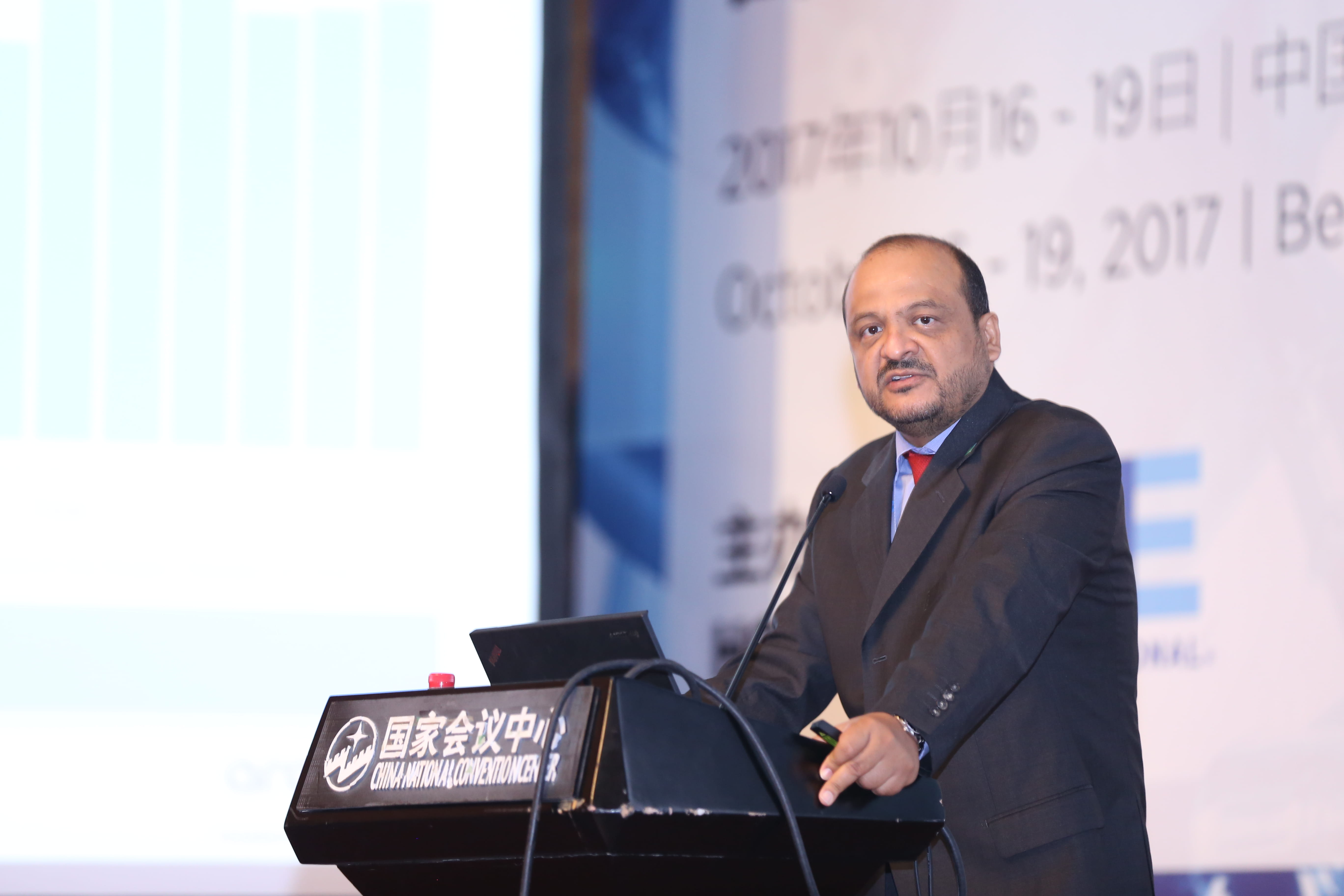Beijing — Saudi Aramco was the sponsor of the recent Clean Fuels for Future High Efficiency Engines Symposium in Beijing, China. Part of the annual Society of Automotive Engineers International Powertrain, Fuels and Lubricants meeting, the symposium focused on peer relations for automotive original equipment manufacturers, trade associations, national laboratories, and automotive solution companies.
The four-day event attracted more than 500 industry professionals from across Asia, Europe, and the Americas, with a total of 245 technical papers presented.
Saudi Aramco’s attendance at an event such as this is key to the development role we play as a leading global exporter of energy and its research into innovative clean and efficient combustion systems for the transport sector. The company’s joint collaborations with several major automakers are designed to demonstrate the internal combustion engine’s (ICE) potential for considerable efficiency improvements and our efforts to accelerate the development of cost-effective, viable technologies that also address the challenge of climate change.
The continuous improvement in ICE efficiency offers clear advantages in regard to greenhouse gas emission reductions while concurrently meeting an ever-increasing global demand for mobility.
Partnering to address challenges, the future
In his keynote address, Ahmad O. Al-Khowaiter, Saudi Aramco vice president of Technology Oversight and Coordination, discussed “The Role of Transport in a Rapidly Changing Energy Landscape.” Al-Khowaiter outlined why a new and innovative approach is required to address the challenges of sustainable future mobility, adding that the energy industry can and should play a more active role in partnering with automakers.
“We need to work with leading minds in this area, and we believe that Chinese players can be at the forefront when it comes to technological advancements,” Al-Khowaiter said.
Professor Neville Jackson, chief technology and innovation officer at Ricardo Plc, echoed Al Khowaiter’s earlier message that vehicle electrification is one element of the future transport energy mix, but also noted that low carbon liquid transport fuels will serve as the backbone of the transport sector for many decades to come.
Frank Zhao, director of the Tsinghua Automotive Strategy Research Institute at Tsinghua University, discussed challenges and strategies to address future fuel and CO2₂ emissions requirements in the Chinese automotive industry.
Presentations were also delivered by Saudi Aramco Research and Development Center (R&DC) principal professional Gautam T. Kalghatgi and R&DC Transport Technology chief technologist Amer A. Amer on “Fuel Requirements of Future Engines” and “Enabling Sustainable Mobility Solutions,” respectively.
Other attendees included Ammar A. Al-Nahwi, R&DC manager, along with Saad Al Khateib, Aramco Asia-Japan Research and Business Development manager, as well as scientists from each of Saudi Aramco’s global fuel research centers and Aramco Asia.
Our place in Asia
During the event, Al-Khowaiter met with a variety of Chinese speaking media outlets, discussing not only transport technology and sustainable energy solutions, but also Saudi Aramco’s strategic intent in Asia.
“Oil will continue to play a key role in the global energy mix, and we are heavily invested in the Asian markets. Some 60% of oil consumption is focused on transportation — the rest is on the production of petrochemicals and other materials,” he said, adding that the petrochemical demand growth rate is greater than that of transportation energy’s demand growth rate.
While the company’s focus is still weighted toward developing crude oil and petrochemicals, the relationship Saudi Aramco has with the transport industry is growing. “We believe policymakers should be technology agnostic,” Al-Khowaiter said. “By developing appropriate standards, they should allow all technologies to compete and allow the most efficient ones to prevail.”
Saudi Aramco believes that the current technologies it is developing strategically across three continents will not only offer realistic solutions to reducing transport carbon footprints, but also provide economical and performance guaranteed engines for the future.
Our research network
In recent years, Saudi Aramco has established a global research network to accelerate the development of sustainable and cost-effective transport technologies. This includes the Saudi Aramco R&DC in Dhahran, along with the Aramco Fuel Research Center in Paris and the Aramco Research Center in Detroit. The activities in these centers are complemented by the company’s close ties with the Clean Combustion Research Center at King Abdullah University of Science and Technology in Thuwal. The centers serve as a platform to innovate, develop, and showcase low-carbon footprint transport technologies.
Scientists at Saudi Aramco’s research centers are dedicated to improving efficiency, reducing harmful emissions, and lowering the cost of engine and fuel technologies. Gasoline Compression Ignition (GCI), for example, is a Saudi Aramco flagship program designed to deliver diesel engine efficiency with considerably lower pollutant emissions. GCI brings together the best elements of today’s gasoline and diesel engines.
Although the GCI combustion process works similarly to a diesel engine, the adapted market fuel has similarities to gasoline. This results in extremely low emissions of soot and nitrogen oxides, and diesel-like engine efficiency. By making ICEs more efficient and mutually adapting engine design with fuels, Saudi Aramco is helping to ensure the sustainability of the transport sector for decades to come.


.jpg?cx=0.5&cy=0.5&mw=10)

